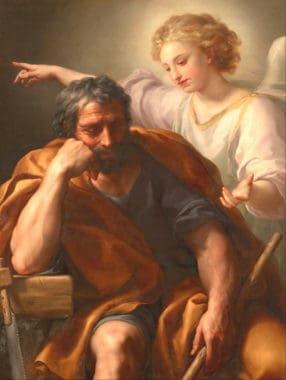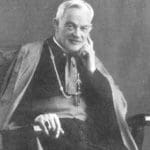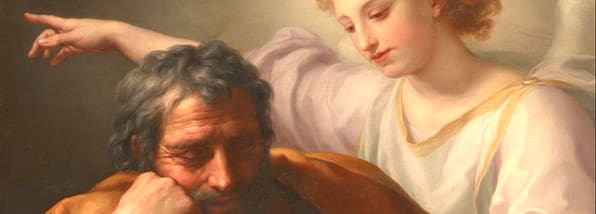THE SPOUSE OF MARY
“Wilt thou know, O vain man, that faith without works is dead? Was not Abraham our father justified by works, offering up Isaac his son upon the altar? Seest thou that faith did co-operate with his works : and by works faith was made perfect ? And the scripture was fulfilled, saying : Abraham believed God, and it was reputed to him to justice, and he was called the friend of God. . . . For even as the body without the spirit is dead, so also faith without works is dead.” James 2:20-25
 1. The time being now imminent, it was essential that Mary should be given a husband and a protector. Of this, too, the Jews must have been aware; for it was a traditional desire among the maidens of the chosen people that they might perhaps, when married, be selected to be the mother of the Messiah. If, then, one easily discovers types of Our Lady in the Old Testament, we do not wonder that anticipations are found of her spouse, St. Joseph. Thus the faithful servant of Abraham, who brought Rebecca from Mesopotamia and protected her on her way; the faithful guardian Mordecai, who protected Esther, and directed her in her great task of saving her people; these and others would seem to foreshadow the Protector of Mary.
1. The time being now imminent, it was essential that Mary should be given a husband and a protector. Of this, too, the Jews must have been aware; for it was a traditional desire among the maidens of the chosen people that they might perhaps, when married, be selected to be the mother of the Messiah. If, then, one easily discovers types of Our Lady in the Old Testament, we do not wonder that anticipations are found of her spouse, St. Joseph. Thus the faithful servant of Abraham, who brought Rebecca from Mesopotamia and protected her on her way; the faithful guardian Mordecai, who protected Esther, and directed her in her great task of saving her people; these and others would seem to foreshadow the Protector of Mary.
2. But most of all is he seen in his name sake, Joseph, the son of Jacob and Rachel; and this anticipation would seem to be sanctioned by the Church in the free use made in her office of the story of one for the glory of the other. Joseph the dreamer; Joseph sent into obscurity in Egypt; Joseph unknown and unnoticed, though coming of a noble line; Joseph the spotless virgin, whose purity could not be sullied; Joseph entrusted with the care of a kingdom, so that “Go to Joseph” becomes the cry of hope for a whole people–one asks oneself of which Joseph these things are said, the old or the new, so perfectly does the type correspond with the antitype.
3. In all these foreshadowings there is much that prepares us for the character and elevation of St. Joseph. Of his antecedents Scripture tells us nothing; even the Apocrypha have less to say of him than of the other two; but this is in keeping with the spirit and nature of the man as he reveals himself in his later action. St. Joseph is the man unknown, the man whose selflessness is perfect, the man who has no history of his own, but only lives in others, for others, fulfilling the bidding of God. He is prepared from within, perhaps all unconsciously even to himself, for the great dignity that is designed for him–the husband of Mary, the foster-father and guardian of the Holy Child, the patron of the Universal Church. What that preparation may signify or include we may endeavour to fathom in meditation, but we know we shall never wholly comprehend. Still, these things we can assume; the spouse of Mary will himself be the most innocent of men; the Guardian of Jesus will be perfect in wisdom and prudence; the Patron of the Church will be one filled with zeal for the glory of the House of God.
Summary Meditation Points:
1. An anticipation of St. Joseph would seem to be reasonably seen in the Old Testament, as in the servant of Abraham, Mordecai, etc.
2. Above all is it seen in the other Joseph, of whom so much can be said that is equally said of St. Joseph
3. And for his early life, we have abundant matter for meditation in the silent training of the future trusted servant of God.
 Editor’s Note: This meditation is from Archbishop Alban Goodier’s “The Prince of Peace” (1913).
Editor’s Note: This meditation is from Archbishop Alban Goodier’s “The Prince of Peace” (1913).
+
Art for this post on the spouse of Mary: The Dream of St. Joseph, Anton Raphael Mengs, 1773-1774, PD-US author’s life plus 100 years or less, Wikimedia Commons. Archbishop Alban Goodier, S.J., www.stmaryscadoganstreet.co.uk, all rights reserved, used with permission.





